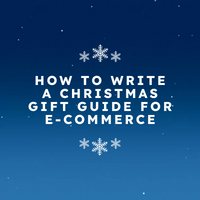A Christmas gift guide, however, is more than just a catalogue to throw some products that aren’t selling into and hope for the best. It needs heart, soul and personality and needs to be very carefully curated to maximise value for your customers, and therefore capture some sales.
To make the process of writing your e-commerce Christmas gift guide easier, we’ve included some of our top tips on how to get started from start to finish…
1) Use Data to Pick Products
Data is the most powerful tool in your arsenal when it comes to determining the products you put in your Christmas gift guide and how to categorise products.
Every e-commerce store owner should have Google Analytics set up which will give you deeper insight into historical data but if you don’t, your e-commerce CMS like Shopify or Magento will be tracking sales for you to analyse.
Look at Market Trends from Previous Years
If you look at the analytics section on your e-commerce platform, you will be able to rewind time to last November and December which are the key months for people buying Christmas gifts.
Looking to see which types of products were selling best in seasonal months of the year is usually a good indicator that people were buying as gifts.
2) Categorise your Popular Seasonal Products
Now that you’ve got a list of your most popular products from Christmas in previous years, you need to start thinking about putting them in categories so that they stand out and it’s not just a continuous list.
Think about whom this would be a gift for and segment that way – is it for him, her, them, a couple or kids in general? Or if your online shop already focuses on a core demographic you could split by age or type of person like ‘Techy Gifts ‘ and ‘Fitness Gifts ‘.
Having these categories allows the reader to skim read for the exact type of person they’re looking to buy for, or you could even write multiple gift guides.
3) Write your Guide
Writing a Christmas gift guide doesn’t need to be too long and fancy because you are showcasing your products after all.
Introducing the blog and writing some clever copy that’s not just a product description is going to hook your reader and get them to click through and hopefully buy!
4) Get your Guide Online Website Blog
If your website has a blog / news function, you will be able to upload it along with relevant images of products that you’re promoting. You’ll also be able to add a Christmas themed header image that you can get from a free stock image site like Unsplash to make it look pretty.
Consider an Online Catalogue
If you don’t have a blog on your website, another option to consider is an online catalogue on a platform like Issuu.
Issuu has lots of free templates where you can upload your logo, change the colours to your brand and add products & text.
This can then be distributed in the same way as a blog article and your customers can read on their phone on the go.
5) Publish and Promote Everywhere!
Whilst a gift guide on your blog is great for SEO because it will target keywords and be internally linked to products, it’s also important to consider the channels you will use to promote it to the world.
Email Marketing
A simple marketing email to your customers with a short preview and then a link to the main article which will showcase all of your products is an effective way to push your blog to thousands of people.
With nearly every single person having emails on their phone in their pocket, there’s huge potential for instant buyers.
Don’t worry if you don’t have a blog to link to, however, as you can use email marketing as your Christmas gift guide. You can just add products, prices and product descriptions to your email which with a good e-commerce email marketing provider can be done automatically.
Social Media
Social media is something you should use to promote Christmas gifts regardless of whether you have a blog.
In 2022, social media is very heavily focused on images, particularly on Instagram where outside of a Story, you can’t actually post links to direct people to your website.
For Instagram, we’d recommend that you get a free Linktree account so you can put a link with multiple website links to blog articles in your bio.
You can create some simple graphics of products with prices using Canva which you’ll add to a post with relevant hashtags and a description.
You can then share these to your story along with links to direct buyers to your website.
Facebook can act similarly to Instagram but with Facebook you can actually include a clickable link to your blog or website in your post, using the same images or videos you’ve created on Canva.
Twitter isn’t used that much for e-commerce but it’s good to have some presence as some user demographics exclusively use Twitter as their social media platform of choice.
Twitter can also be an easier platform to have your blog post shared far and wide – why not try a ‘follow, comment and retweet ‘ competition to expand your reach and following?
You can also tag brands that you sell on Twitter to try and get a few more retweets from those with more followers than you.
Don’t have time to do it yourself?
We know Christmas is a high pressure time of year where you’re banking on sales so you can relax going into sale season.
We have a team of marketing experts who specialise in content, social media and email marketing who can help alleviate that pressure.
Get in touch to find out more about how we can help you promote your e-commerce store and sell more online.
